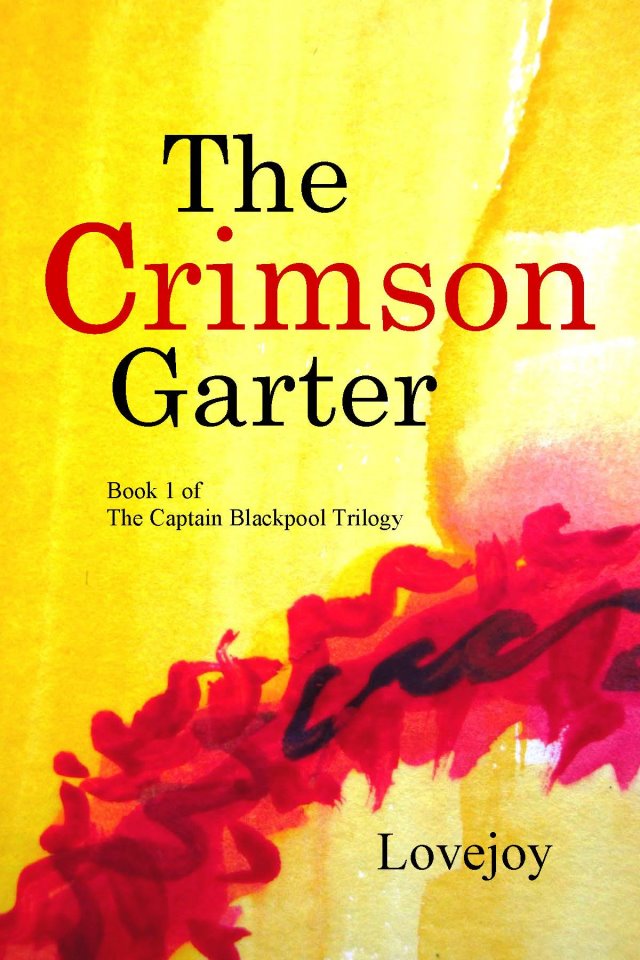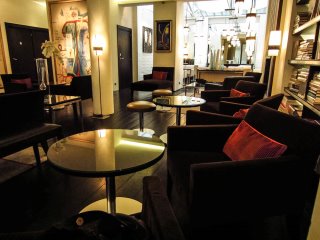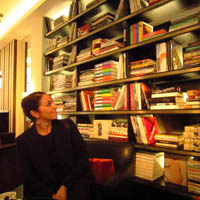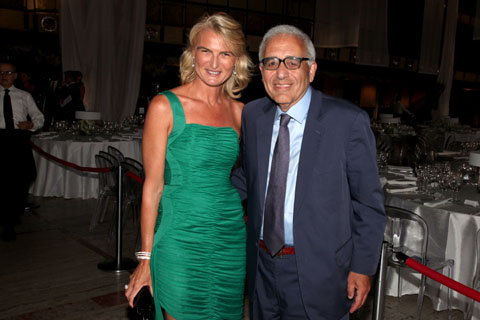
La Fragolina has met Balthazar after her final ballet performance at the Paris Opéra, but she is bound to depart for Marshmoor, joining her husband, Sir Robert Marsh, whom she does not love. Balthazar has a single memento from the ballerina after their kiss in her changing room: a crimson garter. Throughout, Capt Harry Blackpool watches and follows the Marshes’ carriage toward Calais. We continue our serialization of The Crimson Garter, by travel editor Stanley Moss, writing pseudonymously as Lovejoy
Chapter 2
Calais to Dover, a heaving, tossing storm, a tiny bobbing vessel, seasickness and always the ship in motion. Huddled in her berth, if one could call it that—for it was a tiny, low-ceilinged space half the size of her dressing room—with the reeking, omnipresent odour of bilge, La Fragolina wrapped herself in a rough blanket and attempted to remain in the high-sided wooden bunk built into the bulkhead as the ship pitched about. She found she could not easily purge from her thoughts the penniless artist Balthazar, whose noble manner, eyes and lips she remembered all too well. With the utmost of effort she forced him from her mind, only to muse on her destination: the chilly bogs of northern Scotland. She retold to herself the events which had transpired since her farewell to the Opéra, the succession of tiny spaces—cramped dressing room, the anguish of the enclosed carriage in Robert’s intimidating company, and confinement to the dank cabin of the channel craft. Tomorrow it would be carriages and stagecoaches and rustic inns and inedible food for days to follow. She did not relish the prospect. She was grateful that her husband was spending so much time one deck above, in the company of others. His attempts at kindness were awkward and could not induce her to force down what passed for meals on board, simple ship’s biscuit ground and cooked with boiled salted meat, which they served with a beverage of rum mixed with slimy water. Robert could not understand that the sight of it sickened her, and he had no idea of the constant longing she already felt for the ballet. He left her alone in the fetid cabin, checking on her periodically, as if there was somewhere she could escape to. From the dismal space she pondered cruel destiny and the bargain she had made. Like now, there had seemed no other choice. And yet, was the impoverished artist Balthazar a chance for something other than the oncoming fate she so dreaded?
As she despaired, her mind travelled back to her idyllic childhood in Rome, a place and time filled with sunshine and laughter and the constant presence of music. She had filmy and disconnected memories of long tables set outdoors under grape arbours, baskets of fruits and aromatic platters, fragrant loaves of bread, the company of friends and family, rolling hillsides of vineyards, the strains of the mandolin and nights filled with the songs of crickets. There was never a mother present, for she had died giving birth to Grazia. These early years were spent in the company of an adoring father and a resourceful elder brother, who indulged her affectionately, encouraging the lessons to dance which so enchanted her. When her father passed away in her seventeenth year she and Vittorio, aggrieved and orphaned, considered what course they would take with each of their lives. Grazia’s love was the ballet, and she chose to pursue that. Vittorio chose banking, and went to work in a local trading house known to his family. They mourned their father, and the house seemed empty without his presence. Both put on a happy façade, but life was never quite the same, and soon misfortune befell them.
A case of youthful enthusiasm was their undoing. Vittorio was only 24, and he made an unwise speculation in a foolish project having to do with acquiring vast plots of land between Port Said and Suez. He committed the entire family fortune to bonds, whose value quickly plummeted. In days, he and Grazia found themselves near-penniless. He urged her to go at once to Paris to study with a famed teacher, Mme Montichka, before news of their financial collapse became known. The last bank drafts would be honoured, but little more would follow.
It was under Mme Monitchka’s tutelage that she received her brother’s suicide letter, and it sealed her fate. In his final words he begged her to accept the protection and the proposal from Sir Robert Marsh, with whom he had business dealings. Marsh, Vittorio claimed, was taken by her beauty, and wanted to make her his own. She was not to impose on Mme Monitchka’s benevolence any longer, for Madame was not a wealthy woman. Sir Robert appeared later and begged Grazia to be his bride. Even Madame encouraged her to accept the proposal. It would interrupt her studies and end her career, but it would mean comfort and home and a husband. Reluctantly she agreed to marry the Scotsman, and travel with him to Marshmoor, a vast estate in the northwest of Scotland, where he lived in a venerable stone manor house with his elderly mother. She swore Montichka to secrecy about her decision, her husband, her whereabouts, for she could not bear the humiliation of what she felt obliged to accept.
In the cold and wet Highlands she had been forced to give up many things, among them her honourable family name, Grazia Rosetti. Sir Robert had made it clear from the first that henceforth she would be called Grace Marsh. He was, she knew, intent on stripping her of every vestige of her earlier existence, of reshaping her into the trophy he sought. She quickly learned to suppress her feelings, for she was made to suffer after any passionate outbursts of temper. There would be no changing life at Marshmoor. Robert and his mother, Lady Dorothea, were set in their ways, inflexible, and strong of opinion.
Slowly she began to wither. Marshmoor stood miles from any settlement, days’ ride from the biggest city—which was Aberdeen, hardly a vibrant capital on par with Rome or Paris. She could not converse with the help at Marshmoor, for it was not done. When he made his weekly call, she found the vicar’s dull voice like a sedative, and the subsequent, prolonged dinners mind-numbing. When she walked, the groundsmen kept a polite distance. When she visited the neighbouring village, people averted their glances; she was under strict instructions from Robert to keep apart from them. All the limitations were justified with a simple phrase: not befitting of the Lady of Marshmoor. With each passing week she grew paler, until the insensitive Marsh had to notice and voice his concern. Even Lady Dorothea was forced to agree that something in the environment imperilled Grace’s health. They did not understand that it was both the stifling conditions at Marshmoor, and the terrible isolation far from the ballet which was slowly killing Grazia Rosetti.
Finally she went to him and implored him to allow her to return to Paris and resume her studies. In desperation she begged upon her knees for his permission, and she promised to honour whatever conditions he imposed, for the ballet was her only passion. She told him she would die if she were not permitted to return to Monitchka, to the perfection of her craft, if she were forced to stay at Marshmoor any longer. She could see how uncomfortable it made him when she asked, but what choice had she? She knew no other path to recover her happiness.
Sir Robert Marsh had his own opinion of what needed to be done. The girl was barely twenty years old, clearly not yet ready to assume her duties. There was little room for her with Lady Dorothea Marsh still intricately involved with the running of the household. Let the girl get it out of her system, he thought, let her prance about in a foolish costume in front of the stage lights until she had done with it. It might not last that long at all. He set the terms: no more than five seasons in Paris, a monthly stipend, after which she would return to Scotland and become the mistress of Marshmoor. No more talk of the ballet, no more talk of the theatre ever again. Did she promise, did we have an understanding? Yes, Robert, we did.
In those five years away much changed. A last-minute audition at the Opéra led to a position for Grazia in the corps. A twisted ankle for the reigning prima, La Veneziana, had meant Grazia’s substitution and elevation to lead roles. Eventually she had been able to write to Sir Robert that she had herself been named the new prima for a ballet called The Gypsy’s Daughter, and it soon became her signature role. After learning this news, but unknown to her, Robert Marsh visited Paris secretly to watch her on stage. What he saw that night both attracted and repelled him. Consumed by shame during her performance and repelled by the way other men looked at her, he stole away from the Opéra before she had taken her bows, returning to Scotland, and never revealing to her that he had made the trip.
Now La Fragolina found herself somewhere in the middle of the Channel on a chilly night in a dark cabin below deck, five years like a dream vanished. She searched the depths of her soul for an inkling of hope, but all she could fix upon was the artist Balthazar, a man of whom she knew nothing. A man who had sworn his devotion to her in words so forceful that she had given him her own crimson garter! How ironic that in five years in Paris she had met no person whose sincerity had so captured her heart. Perhaps Bernadette would send news of him, who he was, how he might be found. She recalled every detail of him, the dark soulful eyes, the stirring countenance, the full lips which had kissed her so tenderly. She remembered his hands, large and gentle and lithe. She was his canvas and his hands were his brushes, so delicately had he stroked her. Was she ever to feel those exhilarating brush strokes again?
Letter from Humphrey, Earl of Pinckney
To Amanda Pennington-Smythe
Written from Dover
My Dear Miss Pennington-Smythe,
I received your letter in Paris, and was devastated to learn you could not make the trip to attend the final performance of La Fragolina at the Opéra. Do not be so disappointed. Mention of your sister’s unfortunate malaise leads me to believe that the decision to stay in Leamington Spa was the correct one for you both. You must wait until your sister recovers before travelling back to London.
Paris was chaotic in the days surrounding La Fragolina’s departure. People fought in the streets, there were desperate bidding wars for the tickets, restaurants were impossibly crowded, there were rumours on all sides. Only the French could make so much of a simple dancer’s retirement. Most perplexing that her whereabouts are still unknown. They will soon forget now that the new prima, the Black Swan, has begun her roles.
Before I write another word, I must ask you to refrain from referring to me as ‘Pinky,’ a loathsome pet name which has clung to me from childhood. I know you overheard my friends using it, but I would prefer it not be associated with me ever again. Thank you.
I personally asked Baron Schluysen-von Holstein about the origin of La Fragolina’s name. You are correct that the story of her surviving only on strawberries is preposterous, and he too agrees. He says that he himself gave her the stage name one night after a dinner at Maxim’s. She was presented with a choice of desserts and replied she would like two strawberries. When a bowl filled to the brim arrived she sent it back, demanding only two. From that night forward she was called La Fragolina, the little strawberry, in her own beloved Italian language. Quite charming, and colourful enough for a person of the theatre.
I know I had promised to see you whilst in London, but my plans are now altered. In my anxiousness to return I booked passage on a lesser grade vessel from Calais to Dover. Owing to bad weather I spent the better part of the trip below deck, often in the company of a dour Scot named Sir Robert Marsh, not initially a very forthcoming fellow at all. He first told me only that he was travelling home with his wife, and that she would be indisposed for the entire voyage. He seemed barely interested in conversation, until I informed him of my social standing and reported that I had attended the farewell performances of La Fragolina in Paris. He became suddenly more attentive. I believe him a lover of the theatre, and I imparted to him in great detail about how well she is regarded, how much she will be missed, and all the gossip surrounding her which I had heard in the most exclusive circles before leaving town. This surprised him no end. It inspired an excitement in him that his outer fustiness does not suggest. He subjected me to a barrage of questions about her, more than I could answer, but after he had exhausted my knowledge he grew silent and brooded by himself.
I am fond of saying, ‘Share a beverage, make a friend,’ and endeavoured to engage this fellow further, hoping to distract him. The man never once offered to stand me for a mug of ale or spirits, or to reciprocate my generosity. But finally I succeeded in wheedling from him the fact that he lives in a rugged part of Scotland, on a private estate where there are copious salmon streams and excellent hunting. I was able to further glean that he has fifty gamesmen, and that he does not like to be away from home for very long. I remarked to him that hunting was an occupation better enjoyed in company. He replied, ‘Many would think it so,’ which I took to be an invitation. I seized upon the suggestion, and told him that many of my companions considered me an excellent hunter, a fine shot, and affable company. I could not easily resist the temptation of fifty grouse-beaters and overstocked salmon runs. I told him I would drop everything for the opportunity to experience such an unspoiled place and that I could be there almost immediately. He made weak excuses, seemed flustered, though I believe we established a fine friendship and his invitation now stood.
By then the weather had turned dirty, waves pounding over the deck, deep swells, frigid winds. Sir Robert sat alone at the table in the galley, scribbling notes on small pieces of paper. He barely acknowledged me. As the weather permitted I would find him standing outside at the rail, in search of the distant shore over an eternity of wintry whitecaps. He would answer my enquiries about the health of his wife with barely a word. The poor woman never showed her face. They were in a terrible hurry to leave Dover, so that was the last I saw of him.
This explains why, my dear Miss Pennington-Smythe, I have now altered my travel plans and will head north to the estate which he calls Marshmoor, for an extended stay of hunting and fishing before the weather turns. I promise a visit to you and your sister upon my return south.
Meanwhile, I will send along a case of exceptional claret, part of a lot just purchased in France, in hopes that its curative powers serve to improve your dear sister’s health. It should arrive within the week. Please accept my sincere best wishes, my warmest regards, and my humble compliments.
Your dedicated servant,
Humphrey, Earl of Pinckney
Related articles hand-picked by our editors
 Two Parisian hideaways
Two Parisian hideaways
Stanley Moss looks at two distinctive Parisian hotels on opposite sides of town, with very different characters
photographs by Paula Sweet and courtesy Hôtel Le A
 A trio of Parisian delights
A trio of Parisian delights
Hello from the City of Lights, where the brutal cold of February has finally subsided, giving way to mild days which allow the beloved pastime the French call balader, to stroll. Perfect weather for Stanley Moss to write you a love letter
photographed by the author

A stylish summer soirée: the Paris Opera Ballet at Lincoln Center
The Ballet de l’Opéra de Paris was the heartbeat of the night at the David H. Koch Theater, reports Lola Saab
Advertisement
Copyright ©1997–2022 by JY&A Media, part of Jack Yan & Associates. All rights reserved. JY&A terms and conditions and privacy policy apply to viewing this site. All prices in US dollars except where indicated. Contact us here.